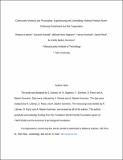Community Violence and Prosociality: Experiencing and Committing Violence Predicts Norm-Enforcing Punishment but Not Cooperation
Author(s)
Littman, Rebecca; Estrada, Suzanne; Stagnaro, Michael Nick; Dunham, Yarrow; Rand, David Gertler; Baskin-Sommers, Arielle; ... Show more Show less
DownloadAccepted version (1.184Mb)
Open Access Policy
Open Access Policy
Creative Commons Attribution-Noncommercial-Share Alike
Terms of use
Metadata
Show full item recordAbstract
© The Author(s) 2019. How does violence affect prosociality? Previous work shows that exposure to intergroup violence is positively related prosociality. Here, we test whether this finding extends to other types of community violence. In a sample of 100 residents from New Haven, CT, we examine the relationship between exposure to—and committing of—violence and economic games measuring prosociality (paying a cost to benefit others) as well as norm-enforcing punishment (paying a cost to impose a cost on selfish actors). We find that both exposure to violence and committing a violent crime are not associated with cooperation but are positively associated with norm-enforcing punishment. These results suggest that unlike during intergroup conflict, violence is unrelated to cooperation when it occurs in a community context. Rather, norm-enforcing punishment is more commonly employed by individuals who have been exposed to community violence and engaged in violent behaviors themselves.
Date issued
2020Department
Sloan School of ManagementJournal
Social Psychological and Personality Science
Publisher
SAGE Publications